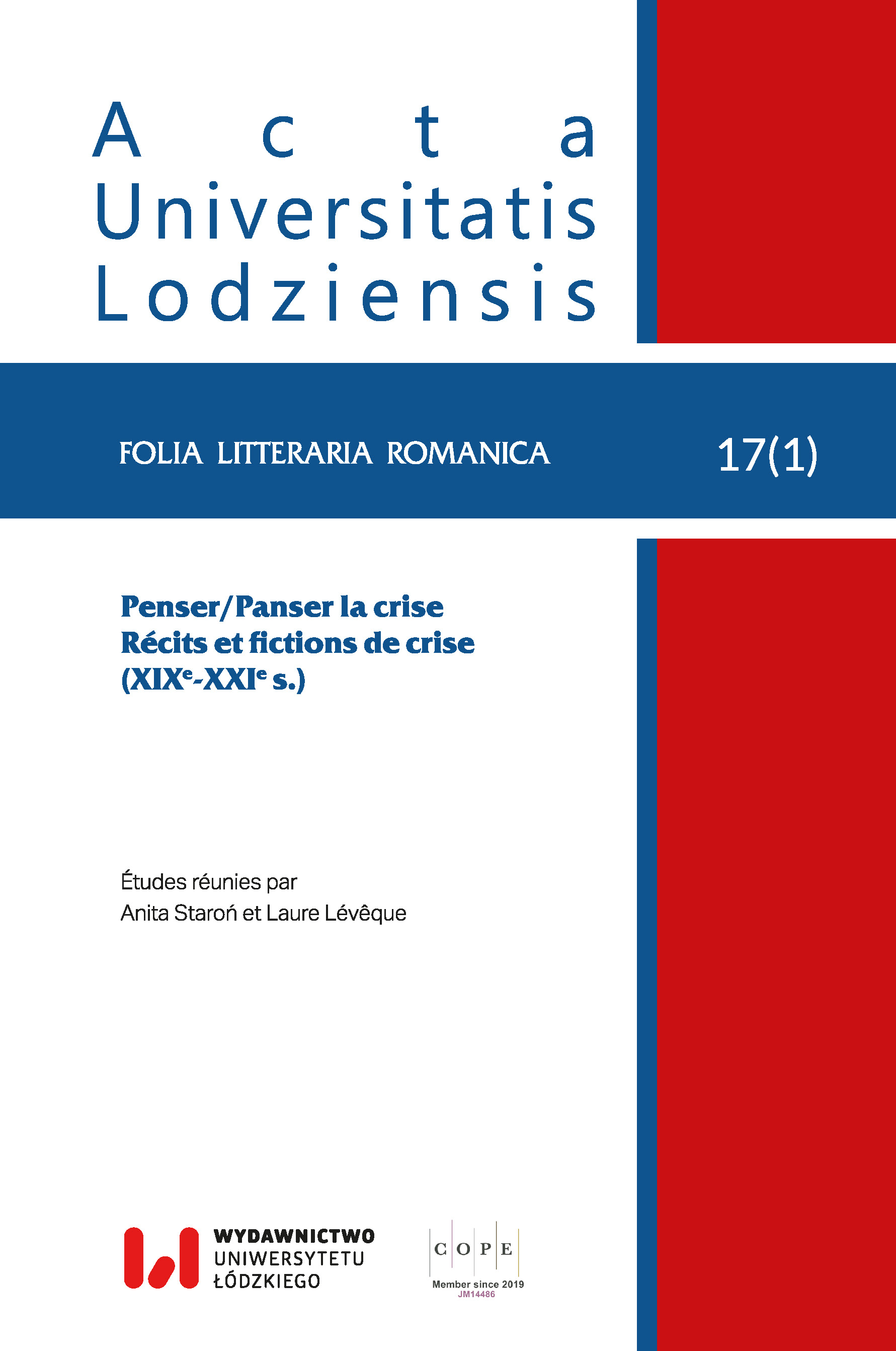The Psychic Crisis in "Les Vies encloses" by Georges Rodenbach
DOI:
https://doi.org/10.18778/1505-9065.17.1.14Keywords:
psychic crisis, Georges Rodenbach, poetry, symbolismAbstract
The end of the 19th century in France is marked by several crises, including the social crisis and the crisis of literature. Under these circumstances, Georges Rodenbach wrote a multi-part poem Les Vies encloses, which in line with Symbolist and Decadent movements contains numerous references to Schopenhauer’s philosophy. The author presents the struggle between the isolated soul which is searching for its own identity and discovering a deeper inner life, and the outside world. Based on the study of the crisis by Edgar Morin and the views of Rodenbach himself, it is possible to distinguish various phases of the crisis that the soul goes through. Indeed, this crisis is a result of the dilemmas that affect the soul and it is reflected by the contrast between light and darkness, external and internal world, security and danger, and eventually, life and death.
Downloads
References
Bachelard, Gaston, L’Eau et les rêves. Essai sur l’imagination de la matière, Paris, Librairie José Corti, 1942
Google Scholar
Bachelard, Gaston, La Poétique de l’espace, Paris, Les Presses universitaires de France, 1961
Google Scholar
Baronian, Jean-Baptiste, « Georges Rodenbach et Octave Mirbeau », Cahiers Octave Mirbeau, 2020, n° 27, p. 269-277
Google Scholar
Barranx, Serge, « Un poète : Georges Rodenbach », Revue de l’enseignement primaire et primaire supérieur, 29 mars 1896, n° 27
Google Scholar
Collin, René-Pierre, Schopenhauer en France. Un mythe naturaliste, Presses universitaires de Lyon, 1979, https://doi.org/10.4000/books.pul.456
Google Scholar
DOI: https://doi.org/10.4000/books.pul.456
Gorceix, Paul, Georges Rodenbach : 1855-1898, Paris, Honoré Champion, 2006
Google Scholar
Henry, Anne, éd., Schopenhauer et la création littéraire en Europe, Paris, Méridiens Klincksieck, 1989
Google Scholar
https://dictionnaire.lerobert.com/definition/crise, consulté le 27.11.2021
Google Scholar
Laude, Patrick, Rodenbach. Les Décors de silence, Bruxelles, Editions Labor, 1990
Google Scholar
Marchal, Bertrand, Le Symbolisme, Paris, Armand Colin, 2011
Google Scholar
Maes, Pierre, Georges Rodenbach, Paris–Bruxelles, Eugène Figuière éditeur, 1926
Google Scholar
Mauclair, Camille, « Georges Rodenbach », La Revue des revues, Paris, 15 février 1899
Google Scholar
Morin, Edgar, « Pour une crisologie », Communications, La notion de crise, 1976, n° 25, p. 149-163, https://doi.org/10.3406/comm.1976.1388
Google Scholar
DOI: https://doi.org/10.3406/comm.1976.1388
Mirbeau, Octave, Les Écrivains, deuxième série, Paris, Flammarion, 1926
Google Scholar
Mirbeau, Octave, « Georges Rodenbach », Le Journal. Quotidien, Littéraire, Artistique et Politique, Paris, 15 mars 1896
Google Scholar
Paigneau, David, « La poétique de la Ville de Georges Rodenbach », Lublin studies in modern languages and literature, 2020, vol. 44, n° 4, p. 5-15, https://doi.org/10.17951/lsmll.2020.44.4.5-15
Google Scholar
DOI: https://doi.org/10.17951/lsmll.2020.44.4.5-15
Paraboschi, Francesca, « L’“Ophélie” di Rimbaud e le Ofelie di Rodenbach », in ACME – Annali della Facoltà di Lettere e Filosofia dell’Università degli Studi di Milano, Volume LVII, Fasciolo I, Gennaio-Aprile 2004, p. 285-305
Google Scholar
Pierrot, Jean, L’Imaginaire décadent, 1880-1900, Publications des Universités de Rouen et du Havre, 2007
Google Scholar
Révil, Ernest, Georges Rodenbach, Bruxelles, Société Belge de Librairie, 1909
Google Scholar
Rodenbach, Georges, Évocations, Bruxelles, La Renaissance du livre, 1924
Google Scholar
Rodenbach, Georges, Les Vies encloses, Paris, G. Charpentier et E. Fasquelle, 1896
Google Scholar
Vielé-Griffin, Francis, « Qu’est-ce que c’est ? », Entretiens politiques et littéraires, 1 mars 1891, vol. II, n° 12, p. 65-66
Google Scholar
Published
How to Cite
Issue
Section
License

This work is licensed under a Creative Commons Attribution-NonCommercial-NoDerivatives 4.0 International License.













